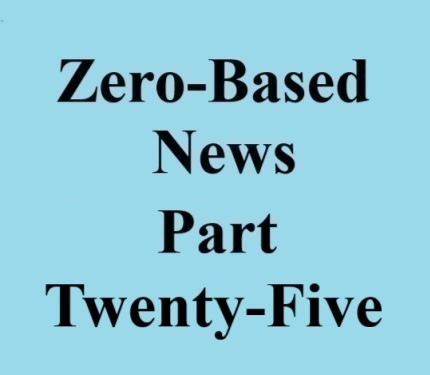Peirspictiochtai Ar An Saol
Zero-Based News
Part Twenty-Five

Follow-ups are critical aspects of Zero-Based News.
Providing information is important for news entities, but it's also important for those same news entities to follow up on what they initially report.
By following up on what they report, news entities provide their readers, listeners, and viewers with additional details and outcomes.
By following up on what they report, news entities provide their readers, listeners, and viewers with additional context.
All of which helps news entities that follow the precepts of Zero-Based News to provide the truth to their readers, listeners, and viewers.
There are different techniques for news entities to utilize when considering follow-ups on what they report.
In years past, as an example, individual reporters, editors, and news directors would maintain what some called a "tickle file."
This type of file would include information to follow up in the future.
The information included items that may need further research, items that weren't yet ready for reporting to their audience, and other items that were of interest.
Sometimes, this information might be related to anniversaries.
Ever wonder why there are news reports on the fifth, tenth, twenty-fifth, and so on anniversaries of important events?
The reason may be in one of those tickle files.
One of the major criticisms of news entities is that follow-ups only occur in certain situations – like certain anniversaries in multiples of five years of major events – but don't take place when follow-ups could help put initial news reports into context.
For example, many news entities will report that Person "X" has been arrested for a terrible crime. There may be headlines in large font in a newspaper. Links that encourage people to click on a website. Broadcasters that highlight top stories.
But, many of those same news entities don't provide follow-up information in quite the same manner if charges of a terrible crime are dropped against Person "X" or if Person "X" is found to be not guilty of a terrible crime. There may be a modest news report without the headlines in large font in a newspaper. There may be fewer links that encourage people to click on a website that explains that charges were dropped or an acquittal was the outcome of a court case. Broadcasters may not highlight the charges being dropped or the person being found not guilty.
On May 25, 1987, according to a statement from the Ronald Reagan Presidential Library and Museum of the National Archives, following his acquittal for criminal acts, a former United States Secretary of Labor, Raymond Donovan, was quoted as asking, "Which office do I go to get my reputation back?"
The short answer to that question: There is none.
News entities that report information – good news, bad news, news of an indeterminate nature – have a responsibility to follow up as additional information becomes available.
The additional information should be reported – in the same format and in the same manner – as the initial information was reported.
One method to do so includes the use of a spreadsheet by news entities following the goals of Zero-Based News.
News entities need to determine if the information being reported is a one-time news report or if it's part of an ongoing series of news reports where follow-ups on that information are likely warranted in the future.
As an example, a high school sporting event that takes place may likely be a one-time news report. A major storm hitting a community is likely to include an ongoing series of news reports.
List the news report about the major storm in the spreadsheet for follow-ups.
In the spreadsheet, list potential follow-up news reports on the major storm. For each potential follow-up listed, detail potential dates to gather additional information and potential dates for follow-up news reports to be issued.
This type of spreadsheet is not a static document.
Instead, it should be seen as a living document.
The spreadsheet detailing potential follow-ups should be reviewed on a regular basis. Information should be added and deleted – through archiving – on a regular basis.
As follow-up news reports are determined to be potentially useful in the future, the initial news report and potential follow-up news report(s) should be added to the spreadsheet.
As follow-up news reports are completed, the initial news report and follow-up news report(s) should be archived for future review, if needed.
As follow-up reports are determined not to be necessary, the initial news report should be archived for future review, if needed.
The next news column in this series will provide an overview of Zero-Based News.
Peirspictiochtai Ar A Saol – Gaelic – Irish – for "Perspectives On Life" is a column focused on aspects of accountability and responsibility as well as ways people look at life.
Contact Richard McDonough at
© 2025 Richard McDonough










